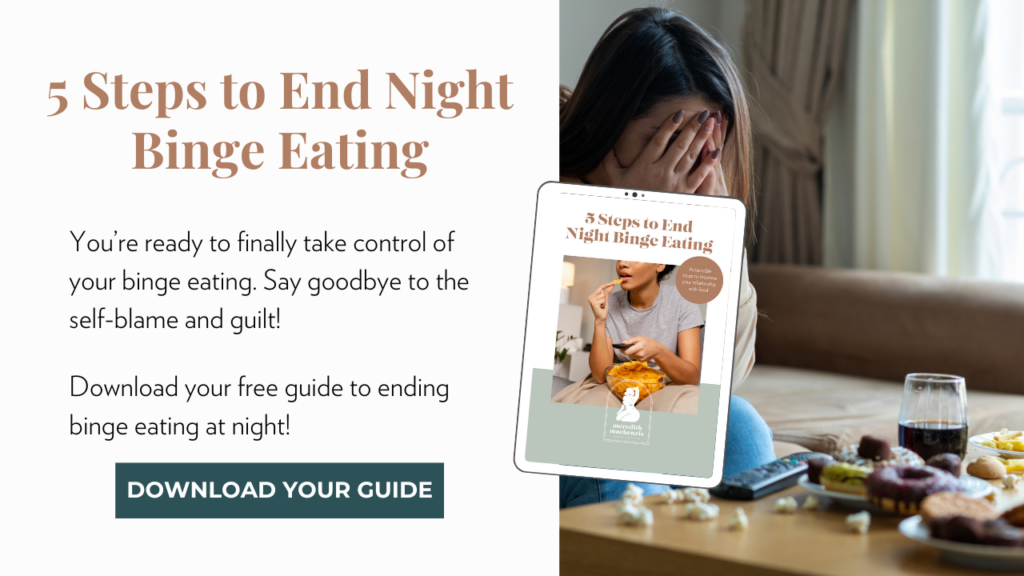Are you struggling with binge eating and feeling tired of the endless binge-restrict cycle? You’re not alone. Understanding the science behind your cravings can help you achieve balance and peace with food.
I’m Meredith Mackenzie, a binge eating therapist, intuitive eating coach, and the founder of the One Body to Love program. I’ve helped hundreds of women end the binge-restrict cycle and learn to eat intuitively. This blog post will explore the biological and psychological factors behind binge eating and provide practical steps to break free from this cycle.
The Cycle of Restriction and Binge Eating
Let’s start with a scenario I hear in my office all the time. You begin your day with a healthy breakfast, feeling good about your choices. Then you get caught up in meetings, delaying lunch until much later than usual. By the afternoon, you experience intense cravings for something sweet or high in calories. You feel sluggish, maybe bored or checked out from work. By the time you get home, you’re hangry and ready for dinner, but the thought of cooking is unappealing. You start snacking while making dinner and feel out of control. Or perhaps it’s after dinner when the kids are in bed, and you finally have a moment of freedom. You sit down in front of the TV and find yourself binge eating. This is a common pattern in the binge-restrict cycle.
Biological Factors
The binge-restrict cycle starts with restriction. Even if you’re not consciously trying to eat less, your body might not be getting enough nutrients. This triggers a biological response:
- Ghrelin is released when your stomach is empty, signalling hunger.
- Neuropeptide Y increases, driving you to seek out food, especially high-calorie options.
- Dopamine is released when you eat, providing a sense of reward and reinforcing the desire to binge on calorie-dense foods.
Your body’s hunger hormones work in a cycle. When you finish a meal, your stomach digests the food, and your blood sugar and insulin levels drop. This signals your gut to release ghrelin, which in turn signals your brain to release neuropeptide Y. These hormones create hunger signals, pushing you to seek out food. Psychologically, your brain rewards you for eating high-calorie foods by releasing dopamine, making you feel good and encouraging repeated behavior.

Psychological Factors
Psychologically, restriction can mean anything from eating small portions to avoiding certain foods you deem unhealthy. This creates a sense of deprivation, making it harder to resist cravings when they arise. Over time, ignoring hunger cues and feeling deprived can lead to intense binges, further fueling the binge-restrict cycle.
Even if you think you’re not restricting, consider what restriction might look like for you. It could be eating very small portions and not getting sufficient nutrients. It could be cutting out specific food groups, leading to nutrient deficiencies. Or it might be telling yourself you shouldn’t eat certain foods, which creates a psychological sense of deprivation. This deprivation sets the stage for binge eating.
Modern Lifestyle and Its Impact
Our modern lifestyles often exacerbate this issue. Skipping meals, working through lunch, and ignoring hunger cues can set you up for failure. Stress and a busy schedule make it easy to fall into the binge-restrict cycle. You might start your day with a good breakfast, but get stuck in meetings, delaying lunch. By the afternoon, you’re craving something sweet or high in calories. You feel sluggish and tired, and by the time you get home, you’re hungry and ready for dinner. But cooking feels like too much effort, so you start snacking and feel out of control.
Read about My Binge Eating Recovery Journey.
The Aftermath of a Binge
After a binge, feelings of guilt, shame, and disappointment are common. This can lead to self-punishment and further restriction, perpetuating the binge-restrict cycle. It’s crucial to understand that this is a biological and psychological response, not a lack of willpower.
The aftermath of a binge can be devastating. You might feel physically uncomfortable, emotionally drained, and filled with guilt. You promise yourself that things will be different next time, but the cycle continues. The feelings of shame and self-blame are heavy, leading to more restriction and setting the stage for another binge.
Breaking the Binge-Restrict Cycle
To break the binge-restrict cycle, recognize the biological and psychological factors at play. Here are some steps to help:
- Acknowledge and Validate Your Feelings: Understand that your body is responding naturally to deprivation.
- Eat Regularly and Adequately: Ensure you’re eating enough throughout the day to prevent intense hunger and cravings.
- Incorporate All Foods: Allow yourself to eat all types of food to reduce feelings of deprivation.
- Practice Self-Compassion: Be kind to yourself and avoid self-blame. Recognize that many others experience the same struggle.
The first step in breaking the binge-restrict cycle is to acknowledge that your body’s response is natural. Eating regularly and adequately throughout the day can help prevent the intense hunger and cravings that lead to binge eating. Incorporating all types of food into your diet can reduce feelings of deprivation. Practicing self-compassion and understanding that you are not alone in this struggle is crucial.
Breaking free from the binge-restrict cycle takes time and patience. Remember, this is not about willpower; it’s about understanding your body’s needs and responding with compassion. If this resonates with you, download my free guide, “Five Steps to End Binge Eating at Night,” to start your journey toward food freedom.
Thank you for reading. If you found this helpful, be sure to subscribe to my newsletter for more tips on overcoming binge eating and learning to eat intuitively. Together, we can break the binge-restrict cycle and find peace with food.

